#5 DRUG TESTING POLICY
Drug testing must be for cause with reasonable suspicion. Simply drug testing due to being involved in an industrial accident is not recommended unless required by federal or state regulations.
Over the years many companies have implemented drug testing policies for various safety reasons. Certain drug testing policies are required by law, such as those mandated by the Department of Transportation (DOT) for truck drivers, while others are by allowed by a collective bargaining agreement. Dozens of companies also implement drug testing policies as a means of controlling their workers’ compensation liability since LC 3600(a)(4) precludes workers’ compensation compensability where an injury is caused by intoxication, by alcohol or the unlawful use of a controlled substance. Unfortunately, many companies choose to implement an arbitrary drugs testing policy mandating that every employee who reports an industrial injury must submit to a drug test. Such is a dangerous policy and may lead to a variety of legal problems. In one instance a warehouse employee who was simply stacking boxes was struck by a forklift driven by an inattentive co-worker. The injured employee was required to submit to a drug test because he filed a workers’ compensation claim while the inattentive co-worker who caused the accident was spared. The injured employee filed suit against the employer for invasion of privacy, asserting there was no reasonable suspicion for being required to submit to a drug test. The case settled out of court for $50,000. The employer learned an expensive lesson. Guess who no longer has a drug testing policy at work?
#4 VACATION AND SICK TIME
When a company policy lacks a description of how vacation and sick time are to be coordinated with workers’ compensation disability, the law allows employees to receive both.
Many companies share a similar vacation and sick leave policy that proclaims “Use It or Lose It.” Only a limited amount of vacation and sick time is allowed to be carried over into the following year. After a while accrual discontinues. Sound familiar? Unfortunately, most company policies lack a thorough explanation of how vacation and sick time are coordinated with workers’ compensation disability. All too often injured employee’s request payment of sick leave while simultaneously collecting workers’ compensation disability. Since these employees are faced with the prospect of losing their sick time if unused, they might as well claim it while off on workers’ compensation.
When a company policy lacks a description of how vacation and sick time are to be coordinated with workers’ compensation disability, the law allows employees to receive both, often resulting in double income. This situation creates a nightmare scenario when trying to bring employees back to work. Receiving double income is quite an incentive to stay on disability. The key to solving this dilemma is for the company to develop a policy allowing for the integration of vacation/sick leave with workers’ compensation benefits to guarantee employees do not collect more money being off work than working.
#3 PROVIDING GRIEF COUNSELORS
Grief counselors should be clinical specialists as opposed to psychiatrists or psychologists.
Let’s face it, sometimes terrible things happen at work. We all have seen horrific news media coverage of major accidents, mass shootings, or large explosions. Co-workers are often seriously injured or killed during such catastrophes. Good employers offer grief counselors to survivors, whether necessary or not. But who are these grief counselors? For the most part they are psychiatrists and psychologists. In other words, they are doctors. Once an employee speaks to a grief counselor a medical record is created. Such a record can later come back to haunt the employer. For example, in one instance an employee returned to an excavation site following a lunch break only to see an ambulance transporting a co-worker away. A worker he hardly knew had died in an industrial accident. The employee spoke to a grief counselor for less than five minutes but sufficient enough to establish a medical record. Six months later the employee was laid off only to file a workers’ compensation claim asserting disability due to nightmares and distress over his co-worker’s death. A post-termination defense did not hold up because a medical record existed prior to layoff, which is an exception to the defense. By doing the right thing and offering grief counseling, the employer ended up paying over $75,000 in work comp benefits to a laid off employee.
#2 PROVIDING A COMPANY CAR
Injuries while driving to and from work in a company car are compensable.
How would you like a company car? Of course you would. A company car can be the deciding factor when attracting the right job applicants to an organization. However, workers’ compensation law punishes employers who offer a company car by eliminating the employer’s reliance on the Going and Coming Rule should an accident occur during a commute to/from work. A company car is a tool and employees are required to bring their tools to work. Therefore, anything happening while using that tool becomes compensable under workers’ compensation law. Even subsidizing employees to bring their own vehicles to/from work may create liability and compensability. This is a potential major punishment employers face since often vehicle accidents result in catastrophic, if not fatal, injuries.
#1 OFFERING LIGHT DUTY
New employees must work six months before being eligible for light duty.
Employers wishing to take better control of their workers’ compensation expenditures often implement a light duty policy to return injured employees to work. Aggressive light duty programs produce a win-win scenario where the employer gets an able-bodied worker back on payroll while the employee returns to a more productive lifestyle. However, under certain circumstances an employer is punished by workers’ compensation law for having a light duty program resulting in skyrocketing costs.
In California we have the 6-Month Rule, codified under LC 3208.3(d). This law requires employees to satisfy a prerequisite of 6-months employment for their employer before filing a compensable psychiatric claim. Exceptions exist involving sudden and extraordinary circumstances but for the most part the 6-Month Rule is exclusionary under the law.
Let’s take a moment to study how an employer can be punished for having a return to work policy. It is somewhat common in California for employees to amend a specific injury claim to add a subsequent psychiatric sequelae. In fact, adding a psychiatric injury to a claim is a prevalent applicant attorney strategy occurring with great frequency. A huge problem with the 6-Month Rule is that it is not limited to pre-injury employment. Instead, time spent on light duty following an injury also counts towards the 6-month prerequisite.
Consequently, an injured employee with only 2 months tenure on the job may return to light duty and four months later while on light duty satisfy the 6-month requirement, allowing the claim to be amended to add psychiatric injury. Therefore, by offering light duty the employer is punished and must now deal with an amended claim along with all the costs that go with it.
The solution to this problem is actually quite simple: An employer’s return to work policy should be amended to require a prerequisite of 6 months employment before any employee is eligible for light duty. Problem solved.
SUBSCRIBE TO OUR BLOG FOR MORE INFORMATION ON LEGAL UPDATES, EXCITING EVENTS AND OTHER WORKERS’ COMPENSATION HOT TOPICS!


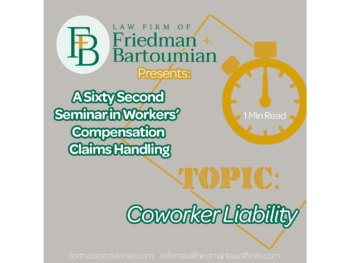
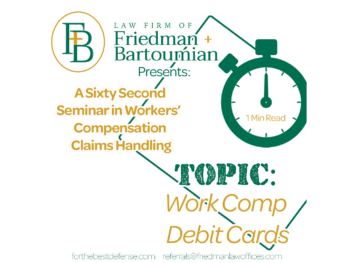
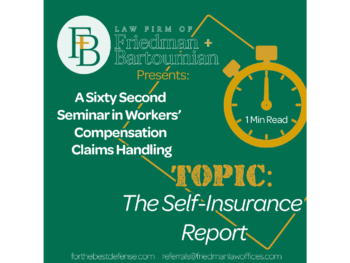
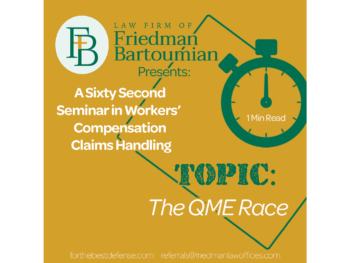
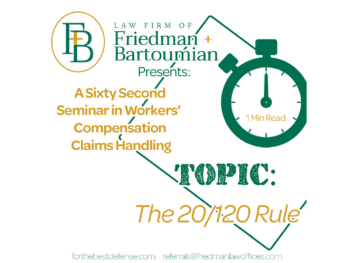


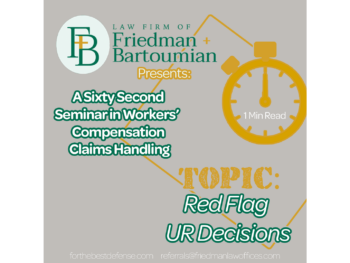
 The Top 18 Ways Workers’ Compensation Law Punishes Employers for Doing the Right Thing! (Part 2)
The Top 18 Ways Workers’ Compensation Law Punishes Employers for Doing the Right Thing! (Part 2)
Leave a Reply